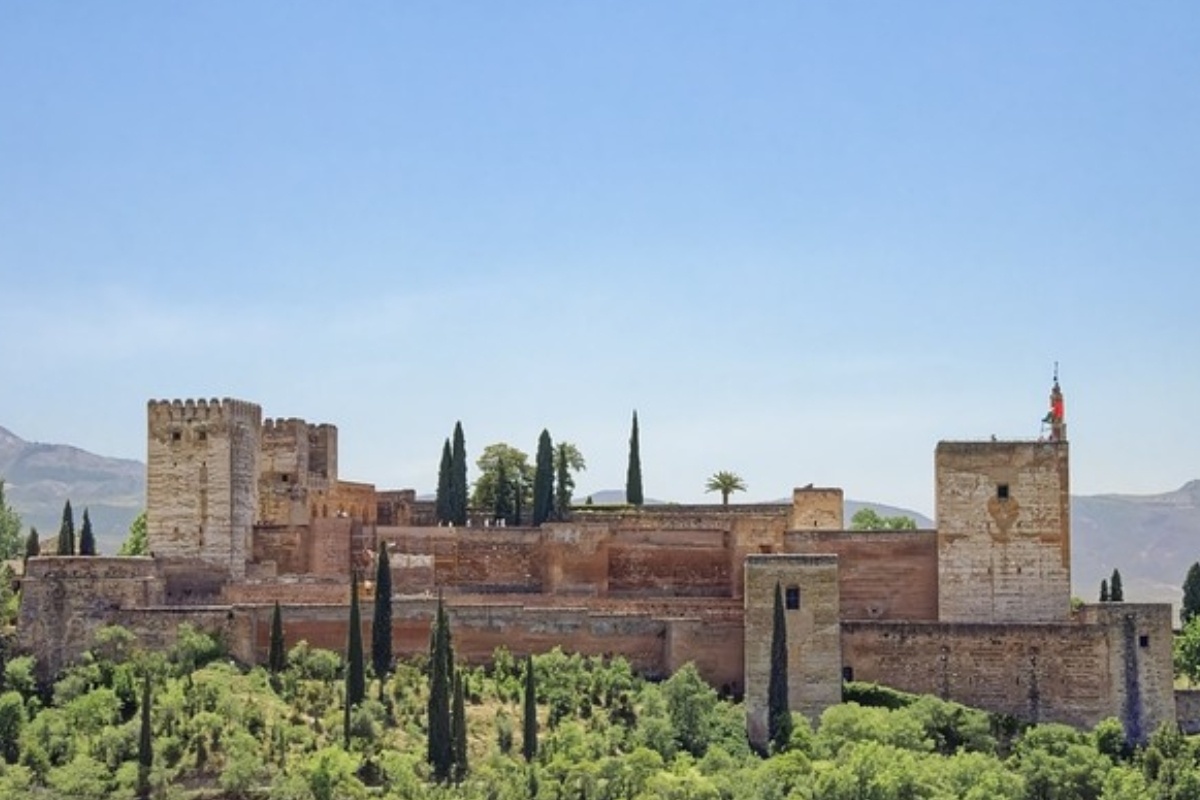More about: Top Attractions at the Granada Alhambra Palace
The Alhambra is a treasure of Islamic architecture that Sultan Alhamar, founder of the Nasrid dynasty, ordered to build in the mid-13th century on Sabika Hill as a military building. Later, it would become the royal residence and court of Granada, until 1492 when the Catholic Monarchs completed the Reconquest of Spain and the Alhambra passed into Christian hands.
Whether you have Alhambra tickets to tour the Alhambra on your own or join one of the guided Alhambra tours, take note of what you can't miss:
The Alcazaba
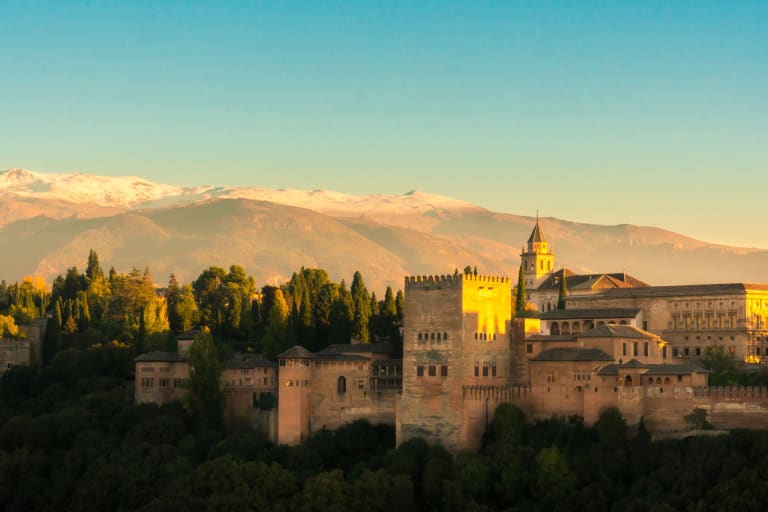
The Alcazaba is one of the top spots if you book tickets for the Alhambra and the Nasrid Palaces. It is a military building where the army resided to defend the perimeter. It is believed that the first to be built was the Alcazaba on the remains of an ancient castle.
It comprises the western end of the palatine city and is the most outstanding part of it if we contemplate it from any viewpoint in Granada.
Plaza de Armas

At the end of a cobbled slope is the Plaza de Armas, which was the original entrance to the Alcazaba. It consisted of a group of buildings where different services were provided to the inhabitants of the fortress.
Tower of the Armas
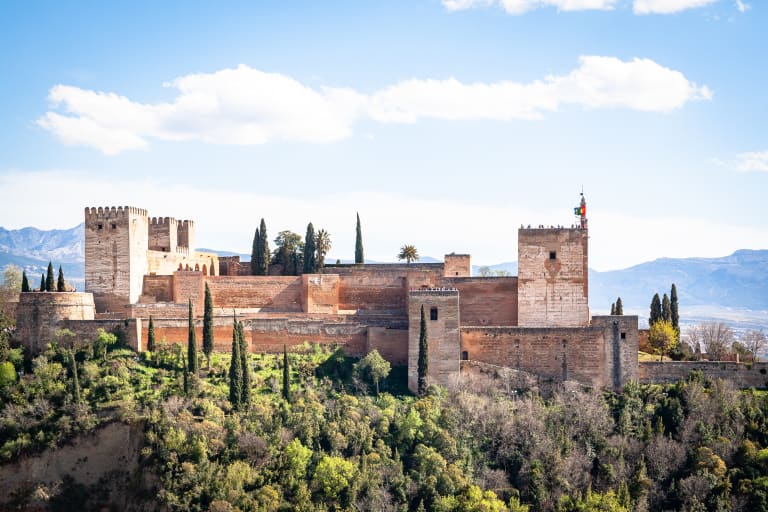
If you book a guided tour of the Alhambra you will also see the Torre de las Armas which, located on the north wall, gave access to the Alcazaba complex from the area of the Darro River. In this way, the Nasrid palace communicated with the Albaicín neighborhood by means of an elevated bridge known as Puente de Los Tableros.
La Vela Tower

It is named after "La Vela", the bell that the Christians rang in this place to celebrate the end of the Reconquest in 1492. For this reason, it is also known as the Bell Tower, which tolls every January 2 to commemorate the victory of the Catholic Monarchs.
Garden of the Adarves

This is one of the corners of the Alhambra in Granada that you will like the most when you see it, because from its balcony you can enjoy wonderful views of the Sierra Nevada, the Torres Bermejas, the Vega and the city, so you can't miss it! You will find it at the entrance of the Alcazaba.
The Palace of Charles V

It is located next to the Nasrid Palaces and is one of the best Renaissance works found outside Italy. Emperor Charles V ordered it to be built in the 16th century in order to enjoy Granada and its Alhambra, for which he was truly fascinated.
Admission to the palace is free and it is worth a visit because it is unique in its style. It stands out for its circular courtyard in the center of this square building, which demonstrates a high knowledge of Roman imperial architecture. If you take a guided tour of the Alhambra, the guide will make a mandatory stop here.
In addition, the Palace of Charles V houses the Museum of the Alhambra, dedicated to Hispano-Muslim and Nasrid art, and the Museum of Fine Arts, whose works come mostly from convents and monasteries such as La Merced, La Cartuja or San Francisco, among many others.
The Nasrid Palaces
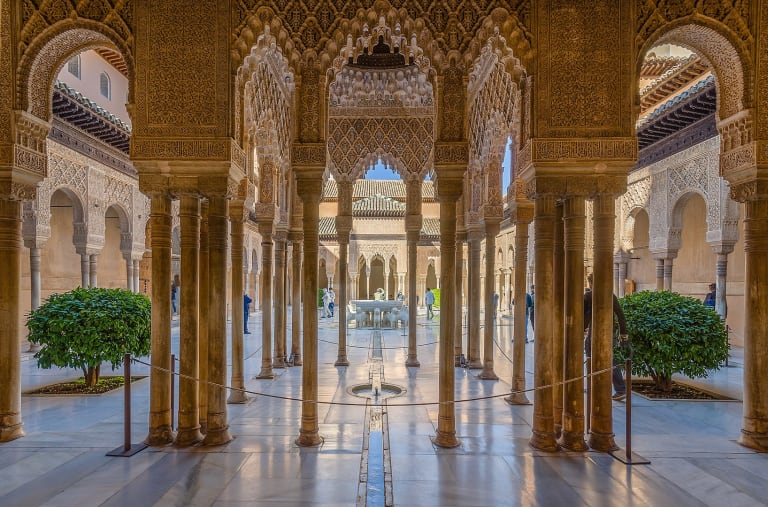
The Nasrid Palaces were the buildings where the kings of Granada resided. They are composed of three independent buildings known as the Mexuar (audience area), the palace of Comares (official house of the king) and the palace of the Lions (the harem and the abode of the royal family).
It is the most visited part and one that I liked the most along with the Generalife. Here you can find such beautiful spaces as the Ambassadors' Hall, the symbolic center of Nasrid power; the Abencerrajes' Hall, the king's bedchamber; the Kings' Hall, the sultan's council room, or the Lions' courtyard, an allegory of paradise.
Note the delicate epigraphic inscriptions in classical Arabic carved in plaster or wood that are scattered on the walls and ceilings of the Alhambra.
- The Mexuar: is the first area we find when entering the Nasrid Palaces and the oldest building of the three. It was here that the sultan dispensed justice, held hearings or met with the council of ministers.
- The Comares Palace: it was the official residence of the sultan and the site of the Nasrid throne room. Its decoration stands out for its richness, since both wanted to astonish visitors with the power of their dynasty, and they succeeded, don't you think?
- The Palace of the Lions: this building corresponded to the abode of the royal family and the harem of the sultan. If you are looking for the famous Patio of the Lions that you have seen countless times in photographs, take out your camera because it is here.
Golden Room

The secretaries of the Islamic court used this room to write down and execute the rulings of the sultan. It is known as the Golden Room because of the beautiful wooden ceiling that covers this room, whose original decoration belonged to the time of Mohammed V.
Hall of the Abencerrajes

On the south side of the Patio de los Leones you will see the Sala de los Abencerrajes, which apparently was the bedroom of the sultan. You will be struck by the spectacular dome that decorates the ceiling, but keep an eye on the fountain in the center because it has a somewhat disturbing story. Ask your guide to tell it to you because you will be amazed!
Hall of the Kings
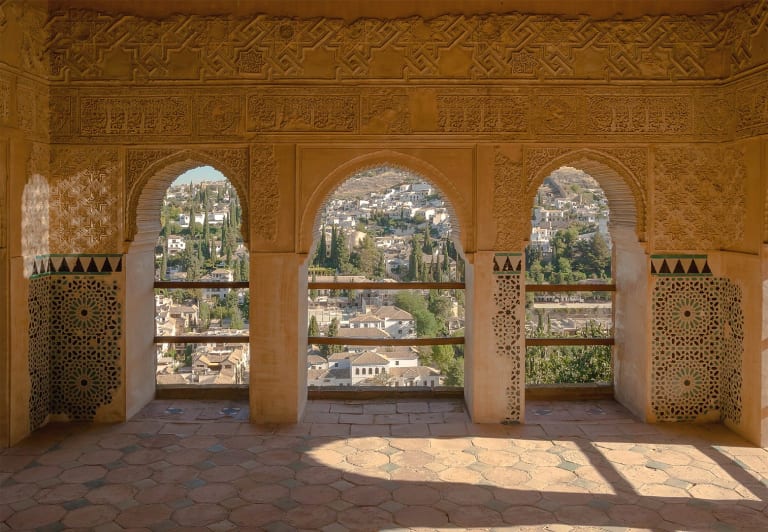
To the east of the Patio de los Leones is the Hall of the Kings, the longest room in the Harem, so called because of the painting that appears on the vault of the central alcove, which is believed to represent the first ten kings of the Nasrid dynasty.
Given the size of this room of the Alhambra in Granada seems to be that it was used for receptions and parties or as a summer room to rest and escape the heat.
Hall of the Two Sisters
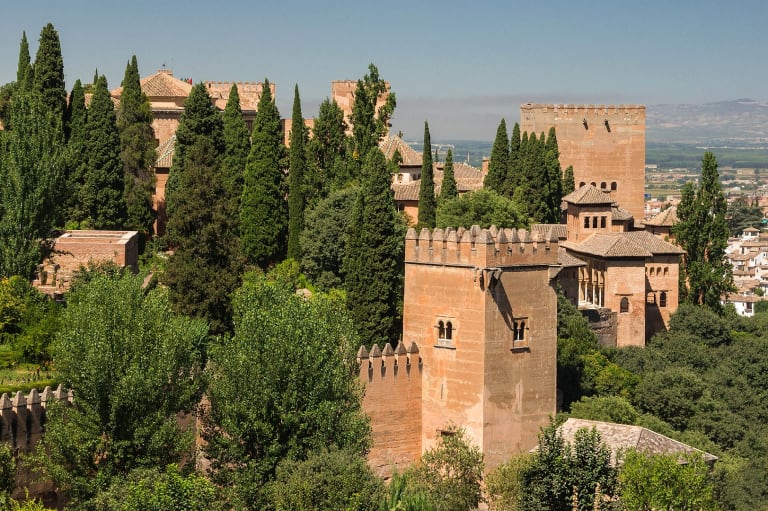
This room was originally created to serve as the Sultan's new mexuar, although it is better known for being the residence of Sultana Aisha, the mother of Boabdil (last king of Granada), when she was repudiated by her husband Muley Hacén.
Corridor and Hall of Charles V

Emperor Charles V was always in love with the Alhambra in Granada, so he ordered to build here his quarters and an office from which to direct his empire. Did you know that the writer Washington Irving also stayed here during his visit to Granada in the nineteenth century? The many stories that this palace must have inspired...
The Partal
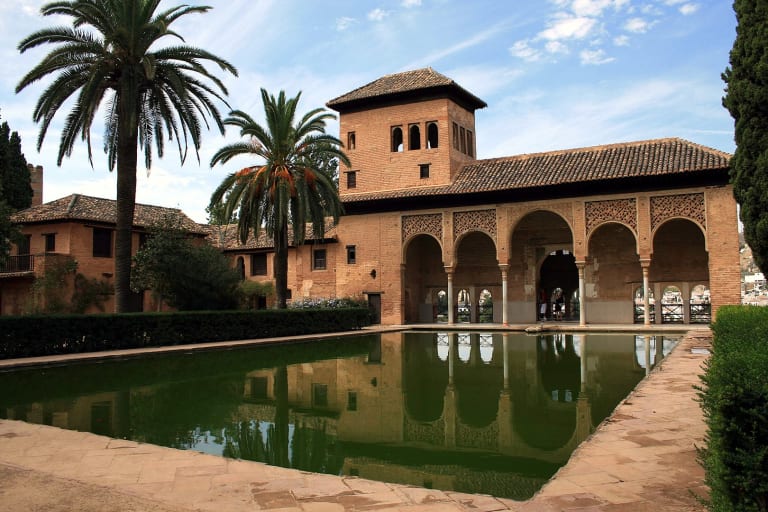
El Partal is an area that houses the remains of the former residence of King Muhammad III. In this area you can still see the palace El Partal with a portico with five arches, a beautiful central pool and the famous Torre de las Damas, which dates from the fourteenth century and is configured as one of the oldest buildings in the Alhambra. In my opinion, it is one of the most beautiful parts of the visit.
Calle Real Alta - The Medina

The Medina, located in the upper part, is a residential, administrative and religious area with stores, public baths and mosques where the officials, nobles and artisans who covered the needs of the palatine city lived.
Its main streets were Calle Real Baja, Calle Real Alta and Calle de Ronda. Today, the old convent of San Francisco is preserved here, which has been converted into a Parador Nacional de turismo.
Generalife Gardens

If you book a guided tour of the Alhambra you will also admire the Generalife, the summer villa of the Nasrid kings located on the Cerro del Sol and one of the few surviving almunias from medieval times in all of Al-Andalus.
Its gardens were conceived for the rest and recreation of the sultans. They were filled with ornamental orchards, vegetable gardens and perfectly manicured courtyards.
Generalife Palace

When the sultans of Granada wanted to escape for a while from the formalities of the court they went to the Generalife Palace, a place designed for relaxation and rest. It is another of the most beautiful areas of the Alhambra where you will surely want to take pictures and videos galore.
Partal Gardens

The gardens of the Partal are a fantastic place to stroll during a visit to the Alhambra in Granada. They extend from the exit of the Rauda to the Torre de las Damas. In the past, the gardens surrounding the royal palaces and the residences of the Nasrid nobility were located in this same place.
Royal Cemetery or La Rauda
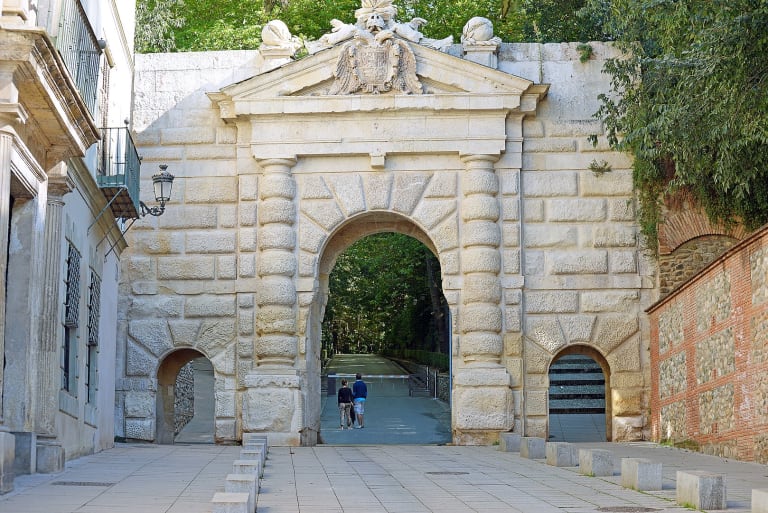
Located between the Nasrid Palaces and the Palace of Charles V, La Rauda is the only cemetery of the monumental complex that remains today. It was intended for the Nasrid royal family but today remains empty because Boabdil, the last king of Granada, moved all the tombs to a village in the mountains.
How to get tickets for the Alhambra
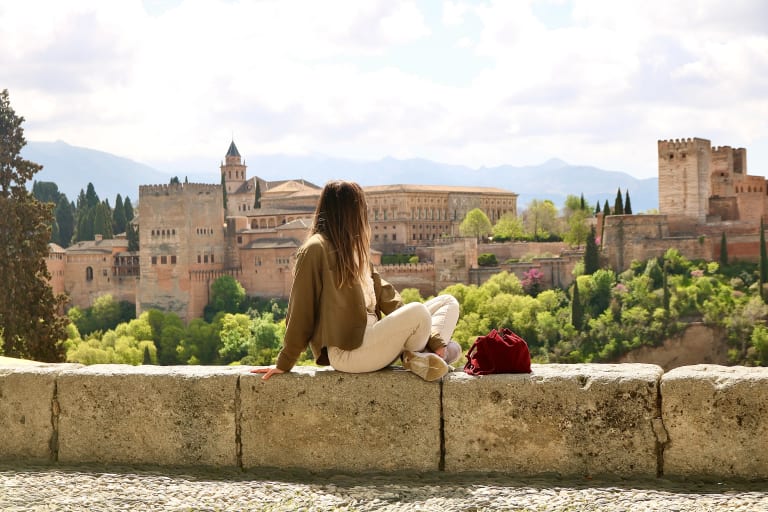
The mythical Alhambra is one of the most beautiful monuments in Spain that every year breaks records of visitors. You can imagine that to see such a place it is advisable to get online tickets to the Alhambra in Granada and at least a month or two in advance of your trip if you do not want to run the risk of running out of them and having to queue endlessly at the box office to try to get them at the last minute.
In Hellotickets you can book tickets for the Alhambra and the Nasrid Palaces, and of course, compare prices, schedules and availability of tickets and guided tours.
How much do tickets cost?
I recommend you to take a look at the tickets to the Alhambra in Granada in Hellotickets because there are several options and prices are quite tight, between 30 and 40 euros approximately.
Organize your visit to the Alhambra
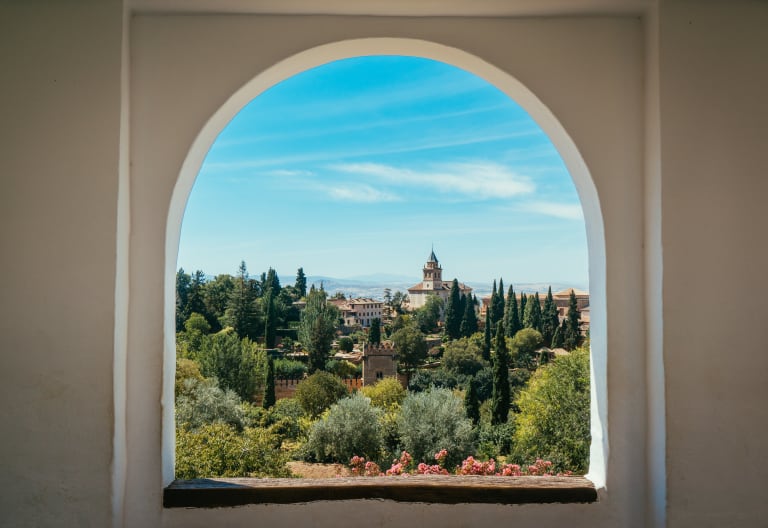
You will get more out of a monument with so much history and so much art if you visit it with a guide on a guided tour because he will explain anecdotes, secrets and details that you probably do not know and that if you see it on your own would probably go unnoticed.
How to get to the Alhambra
There are several options to get to the Alhambra in Granada.
- Bus: there are several urban bus lines such as the C30, C32 and C35.
- Car: enter through the Ronda Sur (A-395). Go to the Granada ring road (N-323/ A-44) heading south (Motril). When you have skirted the city you will see the direction Alhambra (Ronda Sur) to the parking lot of the monument where you can park your car.
- Walking: leaving the Plaza Nueva take the slope of Gomérez. When you reach the Puerta de las Granadas, turn left and continue to the Puerta de la Justicia, which serves as the entrance to the Alhambra.
How long does it take to walk around the Alhambra?
About 3 hours and 30 minutes queuing at the entrance.
Isabel's Traveller Tip
During the visit you will walk a distance of about 3.5 km in total. Remember to wear comfortable shoes!
Other interesting places around: the viewpoint of San Nicolás
You may not know it, but the sunset at the Alhambra in Granada is considered the most beautiful in Spain. The best view is from the Mirador de San Nicolas in the Albaicin neighborhood. From here you will have the best panoramic view of the monument with the Sierra Nevada as a backdrop. It is something magical!



